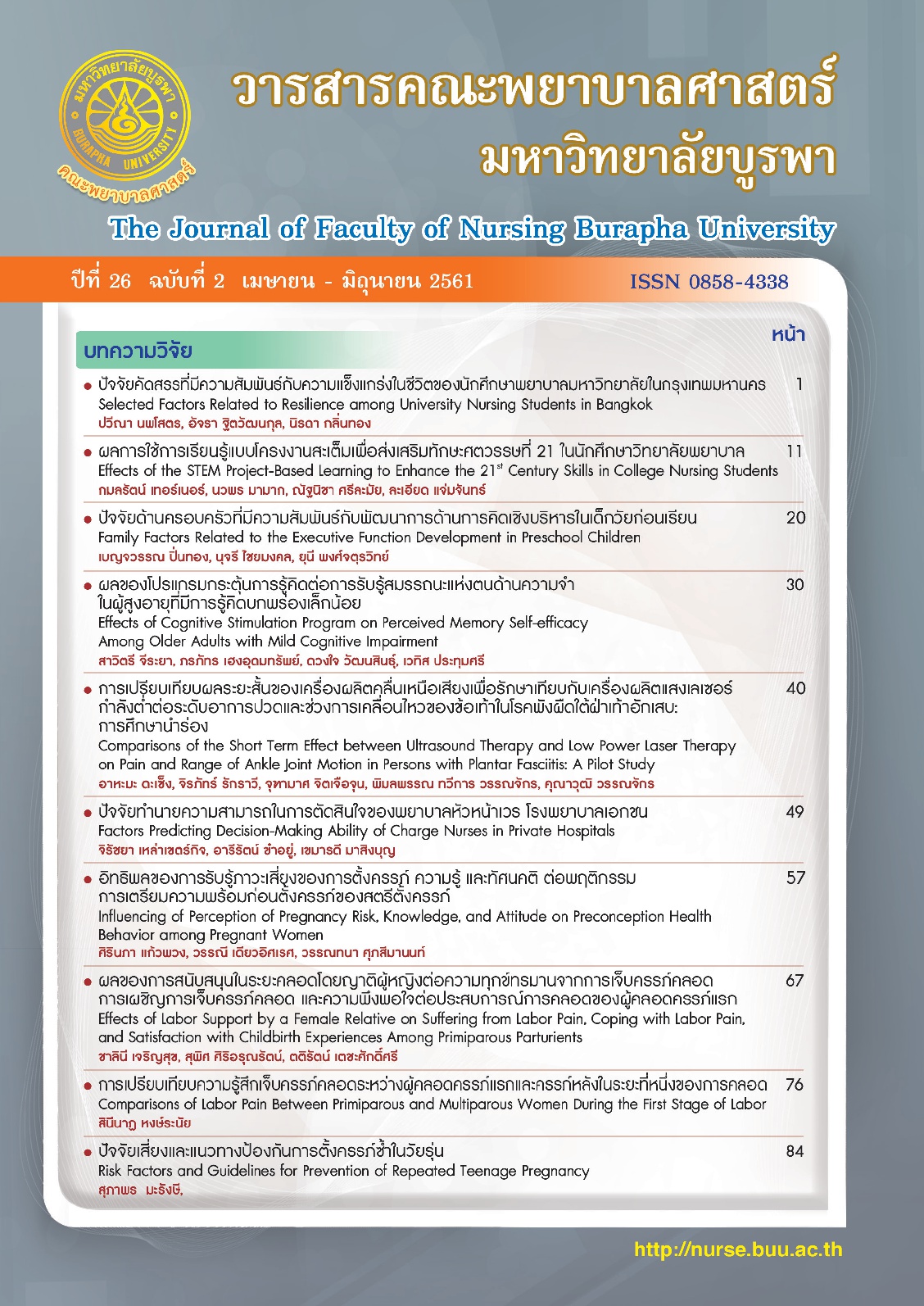อิทธิพลของการรับรู้ภาวะเสี่ยงของการตั้งครรภ์ ความรู้ และทัศนคติ ต่อพฤติกรรมการเตรียมความพร้อมก่อนตั้งครรภ์ของสตรีตั้งครรภ์
คำสำคัญ:
สตรีตั้งครรภ์, พฤติกรรมการเตรียมความพร้อมก่อนตั้งครรภ์, ความรู้, การรับรู้ภาวะเสี่ยงของการตั้งครรภ์, ทัศนคติบทคัดย่อ
บทคัดย่อ
การวิจัยครั้งนี้มีวัตถุประสงค์เพื่อศึกษา พฤติกรรมการเตรียมความพร้อมก่อนตั้งครรภ์ และอิทธิพลของการรับรู้ภาวะเสี่ยงของการตั้งครรภ์ ความรู้ และทัศนคติเกี่ยวกับการเตรียมความพร้อมก่อนตั้งครรภ์ต่อพฤติกรรมการเตรียมความพร้อมก่อนตั้งครรภ์ของสตรีตั้งครรภ์ กลุ่มตัวอย่างคัดเลือกโดยวิธีการสุ่มอย่างง่าย คือสตรีตั้งครรภ์แรกที่มารับบริการ ณ แผนกฝากครรภ์โรงพยาบาลศรีสะเกษจำนวน 109 ราย ระหว่างเดือนกรกฎาคม ถึงกันยายน 2560 เก็บรวบรวมข้อมูลโดยใช้แบบสอบถามการรับรู้ภาวะเสี่ยงของการตั้งครรภ์ ความรู้ ทัศนคติ และพฤติกรรมการเตรียมความพร้อมก่อนการตั้งครรภ์ มีค่าความเชื่อมั่นอยู่ระหว่าง .76-.89 วิเคราะห์ข้อมูลด้วยสถิติพรรณนา และสถิติถดถอยพหุคูณแบบมาตรฐาน
ผลการวิจัยพบว่า พฤติกรรมการเตรียมความพร้อมก่อนตั้งครรภ์โดยรวมอยู่ในระดับต่ำ ( = 6.7, SD = 2.5, คะแนนเต็ม = 16) พฤติกรรมการเตรียมความพร้อมก่อนตั้งครรภ์ที่มีการปฏิบัติมากคือ การไม่ใช้สารเสพติด (ร้อยละ 91.7) และพฤติกรรมที่มีการปฏิบัติน้อย คือการรับประทานกรดโฟลิก (ร้อยละ 3.7) การรับรู้ภาวะเสี่ยงของการตั้งครรภ์ ความรู้ และทัศนคติเกี่ยวกับการเตรียมความพร้อมก่อนตั้งครรภ์ สามารถร่วมกันทำนายพฤติกรรมการเตรียมความพร้อมก่อนตั้งครรภ์ของสตรีตั้งครรภ์ได้ร้อยละ 17.8 (Adjusted R2= .155, F2,108 = 7.58, p< .001) การรับรู้ภาวะเสี่ยงของการตั้งครรภ์มีอิทธิพลมากที่สุด (β = .292, p< .01) รองลงมาคือความรู้เกี่ยวกับการเตรียมความพร้อมก่อนตั้งครรภ์ (β = .263, p< .05) ผลการวิจัยเสนอแนะว่าบุคลากรทางสุขภาพควรมีการรณรงค์ให้สตรีมีการรับรู้ถึงโอกาสเกิดภาวะเสี่ยงของการตั้งครรภ์ มีความรู้เกี่ยวกับการเตรียมความพร้อมก่อนตั้งครรภ์ที่ถูกต้อง และจัดกิจกรรมส่งเสริมให้สตรีมีการปฏิบัติพฤติกรรมเพื่อเตรียมตนเองให้พร้อมก่อนตั้งครรภ์
เอกสารอ้างอิง
(2014). A cohort study of a tailored web intervention for preconception
care. Biological Medicine Central Journal, 14(33), 1-10.
Auriel, E., Biderman, A., Belmaker, I., Freud, T., & Peleg, R. (2011). Knowledge, attitudes, and
practice among women and doctors concerning the use of folic acid. ISRN Obstetrics and Gynecology, 1-5.
Benjamin, B., Levichek, Z., Moretti, M. E., Mah, C., Andreou, S., & Koren, G. (2004). Pregnancy
outcome following rubella vaccination: A prospective controlled study. American Journal of Medical Genetics,130A, 52–54.
Bureau of Reproductive Health. (2011). Reproductive health services. Bangkok: WVO officer of
printing mill. [in Thai]
Centers for Disease Control and Prevention (CDC). (2006). Recommendations to improve
preconception health and health care: United states. Retrieved from
http://www.cdc.gov
Coonrod, D. V., Bruce, N. C., Malcolm, T. D., Drachman, D., & Frey, K. A. (2009). Knowledge
and attitudes regarding preconception care in a predominantly low-income Mexican American population. American Journal of Obstetrics and Gynecology, 200(6), 686.e681-686.e687.
Heaman, M. I., & Guptun, A. L. (2009). Psychometric testing of the perception of pregnancy
risk questionnaire. Research in Nursing & Health, 32, 493-503.
Ibrahim, N. K. R., Al-Bar, H., Al-Fakeeh, A., Al-Ahmadi, J., Qadi,, M., Al-Bar, A., & Milaat, W.
(2011). An educational program about premarital screening for unmarried female
students in King Abdul-Aziz University, Jeddah. Journal of Infection and Pubic
Health, 4, 30-40.
Janz, N. K., & Becker, M. H. (1984). The health belief model: A decade later. Health
Education Quarterly, 11(1), 1-47.
Jittrapirom, A., Chareonsanti, J., & Sriarporn, P. (2014). Pregnancy risk perception, uncertainty,
and stress among gestational diabetic women. Nursing Journal, 41(1), 51-61. [In Thai]
Loadee, N., Sriareporn, P., & Parisunyakul, S. (2010a). Preconception health care for women
of reproductive age. The Journal of Faculty of Nursing Burapha University, 18(2),
51-64. [In Thai]
Loadee, N., Sriareporn, P., & Parisunyakul, S. (2010b). Perceived benefits and barriers of
preconception health care among reproductive females. The Journal of Faculty of
Nursing Burapha University, 18(3), 1-16. [In Thai]
Mazz, D., & Chapman, A. (2010). Improving the uptake of preconception care and
periconceptional folate supplementation: What do women think. Biological
Medicine Central Public Health, 10, 1-6.
Panichkul, P. (2006). Attitudes and behaviors towards preconceptional care of pregnant
women with underlying diseases at Phramongkutklao hospital. Master of Business Administration, major field: Business Administration, Kasetsart university. [in Thai]
Rofail, D., Colligs, A., Abetz, L., Lindemann, M., & Maguire, L. (2011). Factors contributing
to the success of folic acid public health campaigns. Journal of Public Health, 34(1),
90–99.
Seeharuttanapatum, B., & Wimonmala, K. (2013). Knowledge, attitude and premarital health
Check-up behaviour of the couple formation stage in the women health promotion
and family planning unit at BMA medical college and Vajira hospital. Journal of Public Health Nursing, 27(1),46-60. [In Thai]
Strategy and planning division. (2016). Public health statistics 2015. Retrieved from
http://bps.moph.go.th [In Thai]
Tough, S., Tofflemire, K., Clarke, M., & Newburn-Cook, C. (2006). Do women change their
drinking behaviors while trying to conceive? An opportunity for preconception
counseling. Clinical Medicine & Research, 4(2), 97-105.
World Health Organization (WHO). (2013). Preconception care: Maximizing the gains for
maternal and child health. Retrieved from http://www.who.int/maternal_child_adolescent
You, X., Tan, H., Hu, S., Wu, J., Jiang, H., Peng, A., Dai, Y., Wang, L., Guo, S., & Qian, X. (2015).
Effects of preconception counseling on maternal health care of migrant women in
China: A community-based, cross-sectional survey. Biological Medicine Central Pregnancy and Childbirth, 15(55), 1-10.





